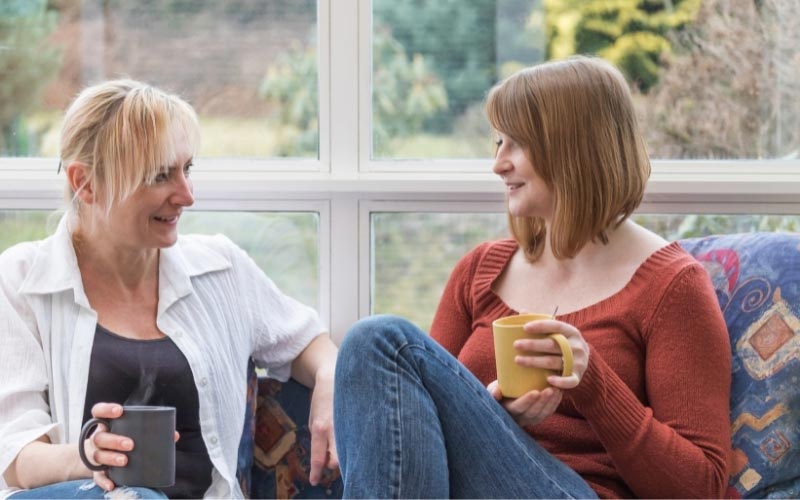While listening is an essential part of human communication, many of us aren’t as good at listening as we may believe.
Listening is more than just hearing – it is the willingness to understand and comprehend what someone is saying.
Listening is important for helping our peers to feel validated, and for helping us to truly empathise and connect with others.
‘Most people do not listen with the intent to understand; they listen with the intent to reply.’ – Stephen R. Covey, American educator, author, businessman and keynote speaker.
So how can we listen better?

Active listening
It takes a lot of skill and practice to be a good listener. Perhaps the first step in becoming a good listener is to practice active listening.
Active listening requires full attention towards the speaker; focusing on understanding both their words and their feelings, proving to the speaker that what they are saying matters.
To be an active listener, it's also important to look and sound interested in what the speaker is saying. This means an active listener will:
- make eye contact with the person speaking
- face the person speaking, and use facial expressions and body language/position that indicates attentiveness, not boredom
- nod encouragingly throughout the conversation to show interest and understanding
- use verbal cues, saying things like “yes” and “uh-huh” to encourage the person to continue
Most importantly, an active listener must listen more than talk.
Active listeners don’t interrupt or finish sentences, and they hold back their initial reactions and thoughts until they fully understand the speaker’s perspective.
An active listener will also avoid speaking about their own related experiences, but will instead ask open-ended questions when the speaker pauses. For example: “Tell me more about how that makes you feel” or “What concerns you about that?”
It is important to listen out for how the person is feeling and thinking, not just the content of what they are saying.
‘We think we listen, but very rarely do we listen with real understanding, true empathy. Yet listening, of this very special kind, is one of the most potent forces for change that I know.’ – Carl Rogers, American psychologist and one of the founders of the humanistic approach to psychology.
Reflective / Empathetic listening
Reflective or empathetic listening takes listening to the next level, focusing more on the speaker’s emotions and empathising with their feelings on a greater level.
One of the techniques used by a reflective listener is to re-state what they believe the speaker has said to confirm their understanding, for example - ”That sounds like it was really embarrassing?”
A reflective listener will also focus on responding to the conversation, rather than leading it. Instead of making suggestions or trying to solve problems, reflective listeners are led by the speaker’s frame of reference and what’s on their mind.
For example, instead of suggesting “You should confront that person!” a reflective listener will empathise and show they understand the speaker by acknowledging their feelings - “So you felt really down for the rest of the day, hey?”
Good listeners don’t try to solve problems
Sometimes people don’t need or aren’t looking for a solution to their problem, but instead are only seeking to be heard.
If you’re not sure whether the speaker wants solutions or just wants to be heard, ask them beforehand.
If the speaker just wants to be heard, a good listener might use responses like “I understand why you would have felt that way” or “I’m so sorry that happened to you.” Try not to worry about your responses though, as this is only a distraction from truly LISTENING to the speaker.
The purpose of listening, and more specifically reflective listening, is to understand a person’s feelings and encourage them to discuss these feelings. Reflective listening can also be used when a person is not yet sure about their feelings, but talking about them (and being listened to) can help them identify emotions and alleviate stress or worry.
What if I think the speaker needs support after I’ve listened to them?
Again, ask!
Once we truly understand a person’s feelings and point of view, it then enables us to take the next step – which might be to ask them if they would like any suggestions or thoughts on possible action to take.
Keep in mind that people often come up with their own solutions once they’ve had the opportunity to talk openly and be truly heard.
If the person still doesn’t want help or advice, you can tell them that you’re there to listen whenever they want to chat again.
If the person does ask for help, we can then take lead of the conversation and speak from our own frame of reference, while still considering the other person’s.
Suggestions like “Maybe you should try this …” or “Have a think about …” can be used, and you can discuss your own thoughts and reasoning behind them.
You may also suggest that they seek the support of a professional counsellor, if the person feels like they need some extra support.
Discover counselling at CatholicCare
Liz Gellel | Marketing Coordinator – Digital Lead
Mary Brown | Relationship Counsellor and Educator
This article uses resources from JoAnne Yates, Professor of Management at the Massachusetts Institute of Technology.
This article was originally published on 18 July 2019 in ccam.org.au news and has been adapted.
Read more: